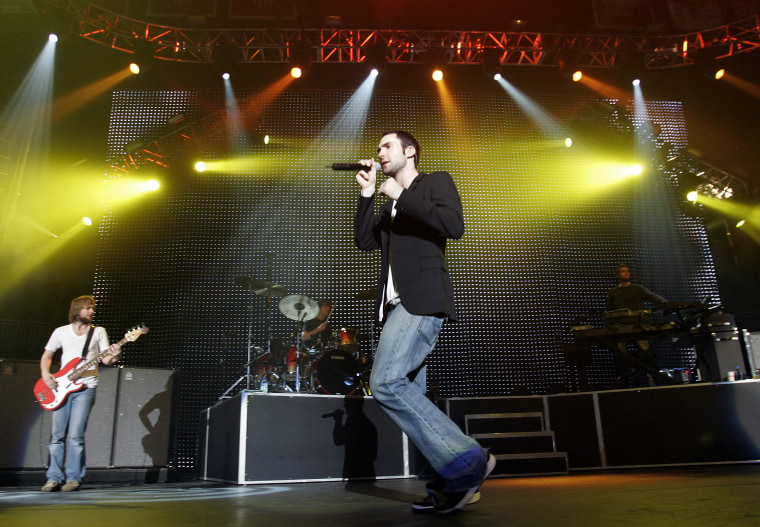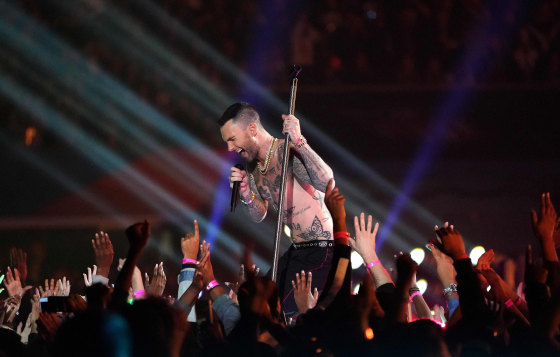Early in Maroon 5's career, the Los Angeles band played a version of itself on the 8th season of television's “Beverly Hills 90210” in an episode that aired in September of 1997. The group went by the name Kara's Flowers at the time, a high school band struggling to make it in actual reality but seemingly loved within the safe confines of a fictional TV venue. Nearly 22 years later, Maroon 5 performed at the 2019 Super Bowl halftime show to a global audience of many millions. On Sunday, as on the set of “Beverly Hills,” a built-in crowd placed in front of the stage cheered the band on, blurring the line between real fan and paid actor.
While most reviewers panned the halftime show as boring, it works as a symbol of Adam Levine and company’s unlikely career arc.
While most reviewers panned the halftime show as boring, it works as a symbol of Adam Levine and company’s unlikely arc. Their career as ambassadors mostly of the maligned genre known as blue-eyed soul can be blamed on an unimaginative constellation of label heads, corporate radio focus groups and in-house music curators. It's music with a lasting impact that is most often felt shortly after you've left a department store or a suburban museum cafe. Indeed, one of the greatest tricks the music industry ever pulled was convincing the world that a band as blandly safe as Maroon 5 deserves such a stage.
SIGN UP FOR THE THINK WEEKLY NEWSLETTER HERE
Maroon 5's history is dotted with the kind of happenstance and nepotism that often punctuates the careers of people who grow up within earshot and eyeshot of celebrities in Los Angeles. Adam Levine and actor Jonah Hill are former classmates and Hill officiated Levine’s wedding, as well as helped him nab his first significant acting role in 2013’s “Begin Again.” Hill’s late brother, Jordan Feldstein was Maroon 5’s manager for years, before his untimely death in December of 2017.
In an introduction to the 2006 book of photo essays MTV released on the band's early years, musician Graham Nash — of the Hollies, and Crosby, Stills and Nash — basically brags that he single-handedly discovered the group when they played his son's high school graduation at Brentwood School in Los Angeles in July of 1997:
"They had played small shows before but this was the first gig I'd seen where they were not only going to play in front of their parents but also, possibly more importantly, their friends. They may have also been slightly nervous knowing that I was there.” — Graham Nash, “Maroon 5: Midnight Miles,” 2006.
Nash goes on to reveal he funded an early recording session.

Clearly, Maroon 5 has had all the right connections since the very beginning. The band’s early iteration, Kara’s Flowers, was ultimately a botched 1990s project that sounds a bit like Fountains of Wayne or the similar nasally approach employed by then-peers in mostly forgotten bands like Superdrag. Still, while the band’s original name did not survive the jump to the big leagues, it does provide insight into something that has plagued both iterations of this group for years: A clunky sexuality that borders on tactless or immature. The "Kara" in Kara's Flowers was apparently a woman who supposedly the entire band was attracted to. This is exactly the kind of 1990s heterosexuality showcased in romantic comedies that at best feel uncomfortable and outdated, and at worst misogynistic and predatory.
These constant unsubtle sexual references are the only smudge in an otherwise squeaky clean image. All you need to know about what America thinks of Maroon 5 is that one of their music videos features the band crashing various weddings in Los Angeles and nobody gets offended. What kind of teenage rebel dreams of growing up to be a wedding singer? Or worse, a wedding singer who crashes weddings without incident due to an immediately apparent harmlessness?
Or even worse? A band who pretends to crash weddings. According to a behind-the-scenes interview with USA Today, a wedding photographer reveals that after the initial surprise, the band would have the crowd sit through another take of the same song. Another audience full of imaginary friends.
The Super Bowl is a difficult concert for a variety of reasons, both musical and logistical. Beyoncé, Justin Timberlake and Lady Gaga have headlined the past three years, and Rihanna was a much-talked about potential candidate for 2019. The singer reportedly turned down the gig, however, as a show of solidarity for unemployed quarterback Colin Kaepernick and the ongoing NFL national anthem protests. In this context, the choice of Maroon 5 says as much about the mindset of the show’s producers than the artists themselves.
It's worth noting that a high point in Maroon 5's career is that they collaborated on a single and accompanying video with Rihanna. For a pop figure as complex as Rihanna, it barely registers in her discography.
These collaborations have helped keep Maroon 5 a household name while the cemetery of their early 2000s radio brethren continues to expand.
And this is just one easy example of how Maroon 5 and Adam Levine use a seemingly endless array of rap and R&B stars to add depth to their plug-and-play pop songs. These collaborations have helped keep Maroon 5 a household name while the cemetery of their early 2000s radio brethren continues to expand. The group has sold millions of records and certainly knows how to string together a hit, but a lot of its longevity is owed to savvy guest spots — not to mention Adam Levine’s own reality TV side-hustle.
Maroon 5 represents the logical public relations conclusion of not just the music industry but most entertainment-related industries; the apolitical strategy of finding artists who will make the most money with the least social impact. The cooperative artist is a genetically modified twist on say, Marlon Brando, but without the giant ripple he caused by rejecting his Oscar at the 1973 Academy Awards in solidarity with Native Americans and their treatment in Hollywood. Well-behaved actors and musicians are the nervous PR rep's dream. They are the silent spokespeople of commerce — willing to sell just enough morsels of hyper-straight and uncontroversial sex so as to stay fairly desirable to the mainstream audience.
Maroon 5 did act as a trojan horse for the brief appearances of Travis Scott and Big Boi when the moment came on Sunday night. According to Adam Levine himself, the performance was “going to have the biggest hip hop presence that there’s ever been on the show.”
And yet, watching Levine awkwardly swing his guitar while dancing along to Travis Scott didn’t feel like a significant moment for rap music, or music at all. Instead, it worked as a nice career retrospective for everything Maroon 5 represents. It was all there: The forced collaborations, the planted audience, an unrequested but still PG striptease (sorry, Janet Jackson.).
Then again, none of this is surprising. Should we blame Maroon 5 for doing what many other adult contemporary pop acts would do in their place? Or maybe it’s time to blame the music industry’s invisible gatekeepers, forever waving them across the finish line.
